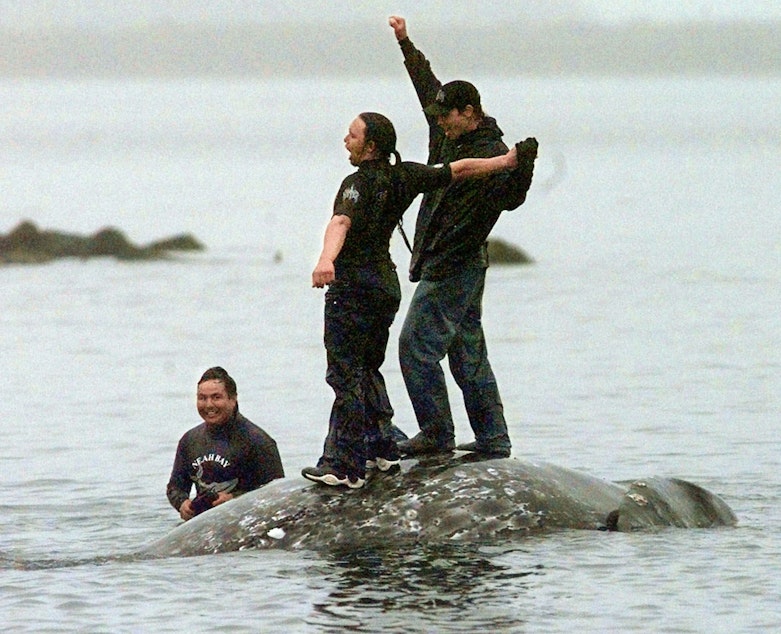Makah Tribe could again hunt whales off Washington coast

The Makah Tribe held a final hunt in 1999, but has not since practiced its whaling rights.
A proposal out Thursday by the National Oceanic and Atmospheric Administration would allow the Makah Tribe to hunt between one to three gray whales annually in their historic hunting range. The Makah live in and around Neah Bay, at the tip of the Olympic Peninsula.
"This gives us hope that we're actually moving forward in the right direction, and that the process is actually beginning to start working for us," says Patrick DePoe, a tribal council member.
The Makah Tribe has treaty rights to hunt gray whales, and did so until the 1920s, until it voluntarily ceased the practice due to concerns over the whales population decline.
The Makah held a final legal hunt in 1999, the one year it was allowed to do so, but the Ninth Circuit Court of Appeals again banned the practice in 2000.
DePoe helped haul the whale to shore in 1999.
"Our entire community was filled with pride. It was an invigorating feeling", he says. "It was a cultural, spiritual component personally that I didn't even know was missing until I felt it. To feel it first hand and to see what it meant to everybody in my community, and to see the excitement."
Animal rights activists have opposed plans to bring back whaling. Humane Society of the United States has been involved in legal action against the Makah Tribe proposal.
Humane Society International President Kitty Block says there is no humane way to kill a whale, "whether it's one, 10, or 100". A group of Makah were condemned by animal right advocates and tribal leaders in 2007 when they hunted a gray whale without permission. That animal sunk to the bottom of the Strait of Juan de Fuca.
Block says the NOAA proposal is concerning because if whaling starts off Washington's coast, it could set a precedent for others who want to start whaling in the U.S. "There is whaling that takes place in Alaska and that's subsistence whaling. My organization does not oppose that," says block. "The Makah whaling is not subsistence whaling. That's why it sits differently in our minds."
Block says she truly respects the Makah Tribe and its history, but she says there are other, more humane ways to carry on ceremonies and traditions.
The Animal Welfare Institute also says the government erred in issuing this proposal, saying "the National Marine Fisheries Service failed to adequately consider the adverse impact of Makah whaling on public safety, to tourists visiting national parks and other federal lands in the area, and to whale watching operations."
NOAA Fisheries spokesperson Michael Milstein says they proposed the plan because the tribe has the right to hunt whales in their treaty with the U.S. government.
"They came to us requesting to exercise that right, and we've considered that, analyzed it in a number of different ways, and decided to move forward," says Milstein. "This proposal... is very detailed, and includes many provisions designed to ensure that if the hunt proceeds it's done safely and humanely."
The soonest hunting could resume is in 2020. However, there are several procedural and legal steps that must take place before then. NOAA's gray whale hunting proposal faces a hearing with a federal administrative law judge August 12, 2019. If the judge grants approval, the Makah could apply for a whaling permit that would last five years.
If approved, the Makah could kill one gray whale in odd years, and three in even years. The difference takes into account the migration patterns of certain gray whale populations that are endangered, and that the Makah would be prohibited from hunting. Over the course of 10 years, the catch limit is 20, with an allowance of 25 "strikes", when hunters launch harpoons into a whale in attempt to kill. Gray whales have the nickname "devil fish" because they are known to fight back when hunted.
The Makah would hunt the Eastern North Pacific population of gray whales. Milstein says that stock "is very healthy, we estimate around 27,000 whales, which is probably about as large as it's ever been. It's fully recovered and de-listed from the Endangered Species List."
A family of endangered gray whales, based off of Russia's coast, do visit the Washington coast. Hunting them is illegal under the NOAA proposal, and would come with consequences for the Makah Tribe.




